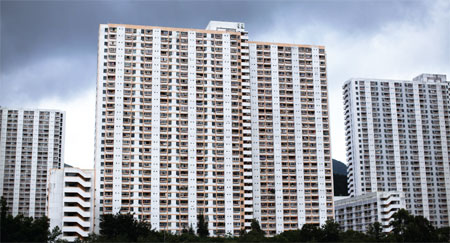Housing tops CE's priority list
Updated: 2013-01-17 06:43
By Li Tao(HK Edition)
|
|||||||||
|
Buildings of Jat Min Chuen public housing estate stand in the Sha Tin area. Chief Executive Leung Chun-ying unveiled a series of measures on Wednesday in his maiden Policy Address to tackle the city's housing issue. Jerome Favre / Bloomberg |

Multi-directional approach proposed to add land supply, aid middle class
Underscoring housing as his top policy priority, Chief Executive Leung Chun-ying unveiled a multi-prong approach to boost land supply, and promised to help grassroots families move into public housing and middle-income families buy their own homes.
"The top priority of the current-term government is to tackle the housing problem," Leung said in his maiden Policy Address on Wednesday.
Total new public and private housing supply in the next five years will be 35,000 units more than the supply in the past five years as the government would boost land supply aggressively with short- to medium-term measures, said Leung.
This translates into a volume of 160,000 units as new home supply over the past five years totaled around 125,000 units.
Leung pledged to give priority to permanent residents in meeting their housing needs, saying that "I believe home ownership by the middle class is crucial to social stability".
To achieve this target, a wide range of measures, including redeveloping a total of 36 government, institution or community (GIC) sites, among others, to generate about 12,000 residential homes, will proceed in a timely manner to accelerate the city's new home supply.
The government will convert 13 green belt areas into residential sites to provide some 23,000 home units. Reclamation of industrial land for non-industrial use will provide another 20,000 residential units, said the Chief Executive.
Residential developments from other government bodies or institutions including Urban Renewal Authority and Town Planning Board will also help add up supply in the city in the coming years, according to Leung. He added that the government will also appropriately increase the development density of unleased or unallocated residential sites in the future.
"The top priority of the current-term government is to tackle the housing problem," Leung said during his policy address.
"We recognize that problems stemming from property prices and rental, cage homes, cubicle apartments and sub-divided units cannot be solved overnight. But we must acknowledge these problems, understand the gravity of the situation, and take the first step forward to resolve them," Leung added.
The government, at the same time, vows to take forward large-scale new development projects as soon as possible to boost long-term land supply in the New Territories - areas of low conservation value - and reclaim on an appropriate scale outside Victoria Harbour.
Bernard Lim, chairman of the Building Committee with the Housing Authority, said the imminent issue for the Hong Kong government today is how to find proper land banks for property development in the city.
"Apparently it (the government) tried to sort out various ways in a bid to beef up housing land supplies, even in the near term," said Lim.
The Hong Kong government will also speed up subsidized home supply, which aims to make available 22,000 public rental housing (PRH) for allocation every year in the short- to medium-term - in comparison with the average 15,000 units these days - by expediting new projects completion and combating the abuse of PRH resources.
The government will review the construction of public housing homes and increase the plot ratio appropriately, according to Leung, who added that as a target, the total supply of PRH will be at least 100,000 units over the five years starting from 2018.
In the meanwhile, 2,100 new residential units under Home Ownership Scheme (HOS) will be offered for pre-sale in 2014, and four pieces of land originally earmarked for the My Home Purchase Plan will also be used for new HOS development.
The Hong Kong Institute of Housing welcomes the government's oath to increase housing and land supply. "To avoid creating social problems in the community, the policies should go in hand with a comprehensive and balanced plan covering factors such as the transportation arrangement, community facilities, greeneries, population and etc," according to the institute.
Hang Seng Bank, in a research note, said the government is channeling much of its energy on a reorientation of the housing policy as the initiatives raised in the Policy Address focus mainly on alleviating supply shortage.
"In contrast to ad hoc or temporary demand-side measures adopted last year, these measures are likely to generate lasting effect rather than short term psychological effect," Ryan Lam from the bank wrote in the note.
Aside from home supply, the government will also strive to boost the supply of commercial space in the city, in order to lower rentals which will help reduce operating costs of businesses.
Leung said his bureaus will take forward initiatives to convert government office buildings and government sites in Central and Wan Chai to commercial use, and to accelerate the development of the North Commercial District on Chek Lap Kok Airport Island.
The government will expedite the plan of energizing Kowloon East and Kai Tak Development, and will take further measures to facilitate revitalization of industrial buildings, hence increasing commercial land supply.
litao@chinadailyhk.com
(HK Edition 01/17/2013 page2)
